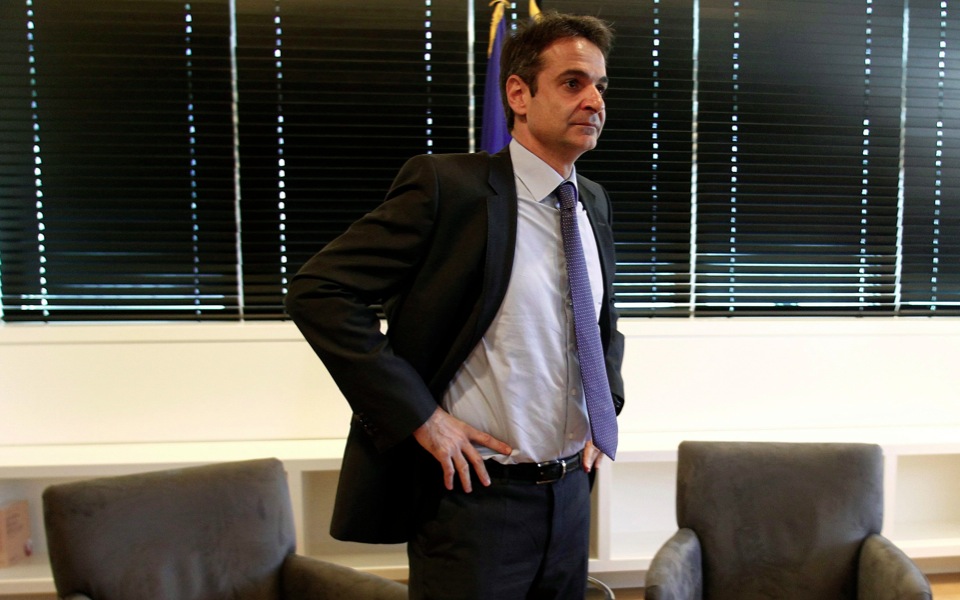Mitsotakis gives rise to liberal hopes but analysts advise caution

The recent election of Kyriakos Mitsotakis as leader of New Democracy has inspired hope among liberal voters anticipating a paradigm shift in Greek politics. It has also sparked concern among smaller centrist parties which are wary of losing their monopoly over liberal ideas.
None of this is likely to happen, analysts say.
The 47-year-old Mitsotakis, a former administrative reform minister, defeated Evangelos Meimarakis, a party veteran from the populist right faction of ND, in a runoff vote that was open to all party members on January 10. He is the scion of a political dynasty but this has often worked to his disadvantage. A US-educated ex-banker, Mitsotakis is commonly described as a free market reformist and diehard enemy of statism. His political enemies prefer to dub him “neoliberal.”
Pragmatism
Despite these credentials, analysts are skeptical of Mitsotakis’s willingness, let alone his ability, to steer the conservative opposition into a more liberal direction.
One reason is that renewing New Democracy and making it electable are not necessarily compatible tasks. Mitsotakis’s effort to balance between these two strategic objectives, analysts say, will to a large degree determine his party’s nascent identity.
“Although rejuvenating the party in terms of political personnel and policies may allow plenty of room for liberal ideas, bringing it back to power requires unity and compromise,” said Lamprini Rori, a political scientist at Bournemouth University and leading member of Brosta, a progressive political think tank.
Mitsotakis will be expected to cooperate with officials who belong to the party’s conservative faction and who supported him during the campaign – like Adonis Georgiadis, a hardline nationalist who endorsed Mitsotakis after being knocked out in the first round in December. At the same time, many of the MPs who displayed their liberal credentials by, for example, recently voting in favor of the cohabitation pact for same sex couples – former ministers Olga Kefaloyianni, Nikos Dendias, even his sister Dora Bakoyiannis – kept their distance from the new leader during his campaign.
Climbing back to power following two electoral defeats at the hands of SYRIZA (four if you count the European Parliament elections in 2014 and the bailout referendum last year) will also require an overture to voters both to the left and right of New Democracy.
“If ND wants to become a serious contender, it will have to appeal to the center while repatriating voters from Independent Greeks and Golden Dawn,” Rori noted in reference to the ND splinter group founded by Panos Kammenos which is the junior partner in the coalition government, and the neo-fascist party.
“In other words, seeking ideological purity on the basis of a solid liberal credo would be politically damaging for New Democracy,” she said.
Tension between free market ideology and traditional conservatism has always been present inside New Democracy’s political religion since its establishment by the late Constantine Karamanlis in 1974.
“Their coexistence has always been considered a given. One cannot easily show the others the door or leave the party for that reason,” said Iannis Konstantinidis, a political expert at the University of Macedonia and head researcher at the ProRata polling company, suggesting that a ND breakup is not in the cards.
The parliamentary vote on the cohabitation pact exposed the limits of social tolerance inside the conservative party. Only 19 MPs – including Mitsotakis – supported the law, 29 voted against and 27 abstained.
Ideological tension naturally cuts across ND’s grassroots supporters. According to so far unpublished data collected by ProRata ahead of the January 10 ballot, 29 percent of voters described New Democracy as a “liberal party,” while 17 percent said it was a “conservative party.”
“In the eyes of the public, New Democracy is neither a clear-cut liberal nor a clear-cut conservative party,” said Konstantinidis.
“The new leader will as a result find it hard to choose one direction over the other,” he said.
Impact
All that should trigger caution against overestimating the impact of Mitsotakis’s election on the liberal parties of the political center.
Potami – which, despite its underwhelming performance in the September 2015 elections, remains the largest and most successful liberal party in recent Greek history – is on standby.
“New Democracy is weighed down by conservative elements; we will only be able to work with them if [Mitsotakis] does away with them,” Potami leader Stavros Theodorakis said this week.
“We would work with the devil in order to change the country, let alone with anyone who shares reformist ideas. For the time being, we have unanimously decided not to join forces with any of the worn-down parties,” he said.
Potami has planned a national congress in February to decide its next steps. During a radio interview earlier this week, Spyros Lykoudis, a left-wing reformist MP, suggested that the magnitude of Mitsotakis’s impact will depend on whether Potami will choose to identify itself as a centrist liberal party or a left-of-center alternative.
Meanwhile, the leader of the pro-business Drasi party, which joined the Potami ticket in the January polls, sounds keener about the prospect of working with New Democracy.
“We are willing to help build something liberal in this country. The election of Mitsotakis is a catalyst in this direction,” said Theodoros Skylakakis, who has previously collaborated with Bakoyannis.
“Mitsotakis’s social and, to a lesser extent, economic liberalism will surely squeeze centrist parties, including the politically damaged Potami party,” Konstantinidis said.
“However, given that the leader of a typical catch-all party will seek to bring together all the different tendencies within it, policy similarities between Mitsotakis and Potami will decrease,” he said.
Ironically, the ascension of Mitsotakis to the helm of ND appears to pose less of a threat to Potami’s singularity than had he not been elected. A beaten Mitsotakis, perhaps joined by other officials from ND’s liberal faction, would have been more tempted to form a center-right, liberal party.
“Mitsotakis's victory in the leadership race essentially traps liberalism within the walls of New Democracy and, in such conditions, it may lose its impact as it is unlikely to be more dominant than conservatism,” Konstantinidis said.
Relevance
For their part, the country’s smaller liberal parties will have to decide whether they will go it alone or merge with one of their bigger albeit adulterated relatives. Cooperating with one of the mainstream parties could prove self-destructive in the long term as future voters would be tempted to side with the stronger partner in a coalition.
Before making up their mind, they would be advised to first answer a more existential question: How relevant is a full-fledged liberal party in a political environment dominated by populism and under an electoral law that punishes small parties?
“Sure, there are issues where liberals could gain issue ownership like the separation between Church and state, the scrapping of permanent jobs in the public sector, or the protection of individual rights,” Rori said.
“But we may have to accept that these issues are not salient enough in the mind of the average voter.”





